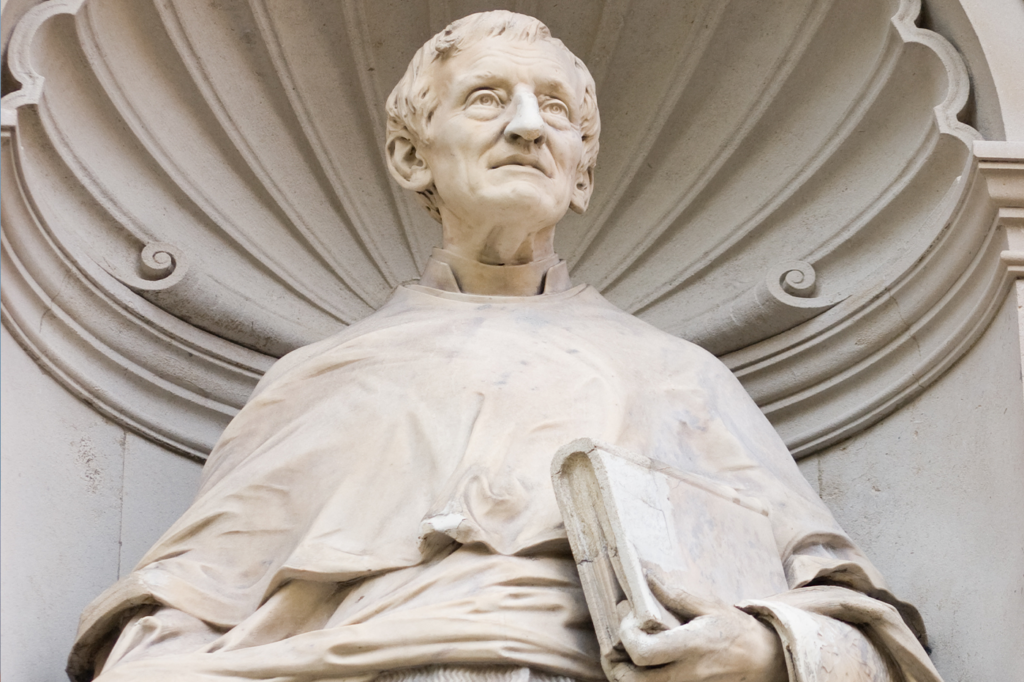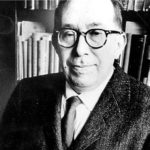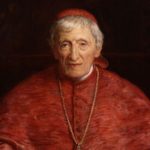Faith in God—or in anything else—is an act of trust that involves the will and intellect together. By faith the intellect accepts claims about truth that the intellect does not see by its own lights, which then form the foundation on which it can reason to new conclusions. Ordinarily faith is a conclusion that the intellect reaches by reasoning. The reasoning of faith proceeds from grounds different from those that strict rational deduction would demand. Although such reasons lack the clarity of, say, mathematical proof, the intellect can see their truth on different grounds. The best account I know of the interaction between faith and reason—of the way in which belief in God is rational, and of the way in which our hearts and minds arrive at their deepest convictions—is found in John Henry Newman’s Fifteen Sermons Preached before the University of Oxford between A.D. 1826 and A.D. 1843.
In the popular conceptions of faith and reason, Newman writes,
Reason requires strong evidence before it assents, and Faith is content with weaker evidence. . . . When, then, faith and reason are contrasted together, Faith means easiness, Reason, difficulty of conviction. Reason is called either strong sense or skepticism, according to the bias of the speaker; and faith, either teachableness or credulity.
Why does faith settle for evidence that does not meet the rigorous standards of reason? Because, Newman continues, “faith is influenced by previous notices, prepossessions, and (in a good sense of the word) prejudices; but Reason, by direct and definite proof.” This is not because faith is weak or foolish, but because “faith is a principle of action, and action does not allow time for minute and finished investigations.”
Start your day with Public Discourse
Sign up and get our daily essays sent straight to your inbox.It may seem self-defeating for a religious person to argue that faith is based on presumption and not proof, Newman concedes, but isn’t it the case that “the great majority of those who have sincerely and deliberately given themselves to religion, who take it for their portion, and stake their happiness upon it, have done so, not on an examination of evidence, but from a spontaneous movement of their hearts towards it?” Their faith may be strengthened by apologetic arguments and reason, but it does not primarily depend on them; it is more personal and living than what arguments could create.
Newman makes this claim for religious faith, but I think it works for all forms of faith, as well. Collecting evidence, investigating claims, and weighing things are good, but at some point we have to get on with life. Since the Enlightenment, some in our society hold up reason as an exclusive ideal. The ideal human being must operate on reason alone, accepting only what he himself can prove from first principles or from his experience of the empirical (sensible) world. But of course, this is not how most human beings and rational arguments work. Faith lets us trust certain sources without thoroughly investigating or thinking through what they say ourselves.
Newman gives a fuller definition of faith in University Sermon 12, “Love the Safeguard of Faith against Superstiton.” Faith is distinguished from knowledge because we know something “when we have ascertained it by the natural methods given us for ascertaining it.” We know mathematical truths from proofs, material things from our senses, things we have not seen or experienced from the testimony of others. Newman confirms that “reason” most properly means “any process or act of the mind, by which, from knowing one thing it advances on to know another; whether it be true or false Reason, whether it proceed from antecedent probabilities, by demonstration, or on evidence.” Reason in this sense merely asserts x in light of y. When it is exercised rightly, it leads to true knowledge; when wrongly, to mere opinion and error.
Faith and reason, Newman continues, are not opposed mental actions, but a similar intellectual act operating on different grounds:
Faith, then, and Reason, are popularly contrasted with one another; Faith consisting of certain exercises of Reason which proceed mainly on presumption, and Reason of certain exercises which proceed mainly upon proof. Reason makes the particular fact which is to be ascertained the point of primary importance, contemplates it, inquires into its evidence, not of course excluding antecedent considerations, but not beginning with them. Faith, on the other hand, begins with its own previous knowledge and opinions, advances and decides upon antecedent probabilities, that is, on grounds which do not reach so far as to touch precisely the desired conclusion, though they tend towards it, and may come very near it. It acts, before actual certainty or knowledge, on grounds which, for the most part, near as they may come, yet in themselves stand clear of the definite thing which is its object. Hence it is said, and rightly, to be a venture, to involve a risk; or again, to be against Reason, to triumph over Reason, to surpass or outstrip Reason, to attain what Reason falls short of, to effect what Reason finds beyond its powers; or again, to be a principle above or beyond argument, not to be subject to the rules of argument, not to be capable of defending itself, to be illogical, and the like.
Here Newman is saying that reason is the exercise of the mind by which we move from x evidence to y conclusion. For reason broadly conceived, this means moving from some kind of proven evidence to a theoretical conclusion. However, faith reasons not from direct empirical evidence placed before us, but from grounds of trust or probability based on inclinations and dispositions of the heart. Thus faith might say something like: “I assent to this doctrine because people I trust taught it to me,” or “because good people think this way,” or “because this looks like a miracle and I have seen miracles before.”
It means moving from probabilities or likelihoods, inclinations and dispositions of the heart, to other conclusions that may not be as sure as a typical rational conclusion. Antecedent probabilities are a concept at the heart of Newman’s understanding of faith: “Given the trustworthiness of this source, or given the nature of x, it is likely that y is the case.” Probabilities are not reducible to a particular scientific standard, but to the moral temperament of each individual. You need to have a rightly disposed mind in order to judge them rightly.
Faith is therefore not something that people possess or lack because of happenstance or genetic makeup, but because of their likes and dislikes, their hopes and opinions. Faith is also a matter of action, and it requires action before all of its conclusions are proven to the same degree as rational conclusions—which they may never be. This is why faith can make conclusions that reason cannot, and why it is a risk, a risk that Newman will argue is an indicator of the state of our heart and an action for which we can be held accountable.
Faith as a kind of reasoning based on presumption makes sense of the fact that different people accept or reject the same fact when they hear it. Newman is not a relativist about religious truth, thinking that all religious claims are equally lacking in evidence that might make some more true than others. But, he argues: “Most men must and do decide by the principles of thought and conduct which are habitual to them; that is; the antecedent judgment, with which a man approaches the subject of religion, not only acts as a bearing this way or that, . . . but, further, it practically colors the evidence . . . and interprets it for him.” We may be rational actors, but the dispositions of our hearts govern our judgment.
Of course, Newman continues, the same is as true of unbelief as of faith, which is no less opposed to reason than faith is:
As Faith may be viewed as opposed to Reason, in the popular sense of the latter word, it must not be overlooked that Unbelief is opposed to Reason also. Unbelief indeed, considers itself especially rational, or critical of evidence; but it criticizes the evidence of Religion, only because it does not like it, and really goes upon presumptions and prejudices as much as Faith does, only presumptions of an opposite nature. . . .
Indeed, Newman continues, in some way, all natural reasoning requires an act of faith. You must build on a foundation and claim an x from which to infer a y:
However full and however precise our producible grounds may be, however systematic our method, however clear and tangible our evidence, yet when our argument is traced down to its simple elements, there must ever be something assumed ultimately which is incapable of proof, and without which our conclusion will be as illogical as Faith is apt to seem to men of the world.
The ordinary empiricist, for instance, proceeds from a strong antecedent probability that his senses are trustworthy; that the universe is constant; that the scientific method is reliable; and that certain instruments, scientists, and journals are trustworthy. He does not work out philosophical proofs for the accuracy of these presumptions every time he wants to draw a conclusion from them.
Therefore the question should be not whether we have faith, but in what or whom we have faith, and why. Why is one person persuaded of an argument from design or an argument for the possibility of miracles? The nexus and convergence of his other beliefs. Perhaps an argument can help shape and form those beliefs, but no apologetic argument can knock down or substitute for that complex of smaller reasons and loves, known and unknown, by which we believe what we believe.
If arguments have only so much persuasive power, what can keep our faith from going bad? If faith is a matter of presumption and prejudice (good or bad), as Newman himself has granted, it can easily become a matter of credulity, superstition, bad prejudice, and bigotry. There may be antecedent probabilities for what is true, but surely there are also antecedent probabilities for what is false. We need to have some kind of safeguard for faith, some kind of “corrective principle.”
Most of us instinctively follow John Locke and the thinkers of the Enlightenment in claiming that reason is that safeguard. We would say something like the following (as Newman puts it):
The young, the poor, the ignorant, those whose reason is undeveloped, are the victims of an excessive faith. Give them, then, education; open their minds; enlighten them; enable them to reflect, compare, investigate, and infer; draw their attention to the Evidences of Christianity. While, in this way, you bring them into the right path, you also obviate the chance of their wandering from it; you tend to prevent enthusiasm and superstition, while you are erecting a bulwark against infidelity.
However, the Bible does not counsel us to use only Reason to purify our faith. Jesus says he is the good shepherd, that he knows his sheep and they know him by his voice. But sheep are not known for using reason well, or at all. They respond not because of argument, but because of love. Thus, Newman argues:
The safeguard of faith is a right state of heart. . . . It is holiness, or dutifulness, or the new creation, or the spiritual mind, however we word it, which is the quickening and illuminating principle of true faith, giving it eyes, hands, and feet. It is Love which forms it out of the rude chaos into an image of Christ; or, in scholastic language, justifying Faith, whether in Pagan, Jew, or Christian, is fides formata charitate. . . . It is the new life, and not the natural reason, which leads the soul to Christ.
Saving faith is joined to the gift of love that comes from God. It comes from feelings enkindled by God’s grace that make us think that certain evidence is sufficient even though it falls short of a complete proof—feelings that move us to make an act of the will that trusts in God. Faith is the reasoning of a religious mind or what scripture calls a renewed heart, and the religious person feels its message to be probable because he has a strong love for it, even if he lacks rational proof of its conclusions. Thus, Newman concludes, faith proceeds from our moral state, not our intellectual state. It always remains an initial principle of action, but it becomes perfected “not by intellectual cultivation, but by obedience. . . . It acts, because it is Faith; but the direction, firmness, consistency, and precision of its acts, it gains from Love.”
Let me make a few observations in conclusion. If Newman is correct, we should be prepared to give an account of what we believe and why. But even more important than that, we should ask who or what we are obeying, what is forming our will, what we presume to be probable, what we love and worship—because those things shape our reasoning about religion and other matters more than rational argument. They provide the lenses through which we will rightly or wrongly see the world. Matthew Franck recently wrote that we need to examine our prejudices to make sure they are worth keeping. And as Thomas Norris put it, summarizing Newman’s view, “The kind of person one is determines what one seeks and accepts.”
We hear more and more about the “nones,” the young people who now say they belong to no religious group, that they are spiritual but not religious. Newman would balk at such a phrase. He would question whether many “nones” are committed skeptics or, more likely, atheists of convenience and apathy. He would think that being spiritual but not religious really means that you want to believe in a God of your own making on your own terms, a God who is more of an emotive forcefield than a lover and lawgiver. It does nothing to address the gravity and reality of evil; it merely anesthetizes us against the dilemmas of the human condition.
We should resist such moral numbness and strive toward a life of moral and spiritual greatness. This means we must follow the logic of arguments and antecedent probabilities to their conclusions and act on them, even if it costs us dear. The more John Henry Newman studied the history of the Christian Church, the more he came to conclude that its fullness lay in the Catholic Church. This journey “out of images and shadows, into the truth,” as he put it, meant giving up his work as an Oxford tutor and Anglican priest, sacrificing his respectability, and suffering the rejection of friends and family. It was a price worth paying for a life lived in the truth—a life of right faith, formed by right love.
This article is adapted from a talk given for the Thomistic Institute at the U.S. Military Academy.














